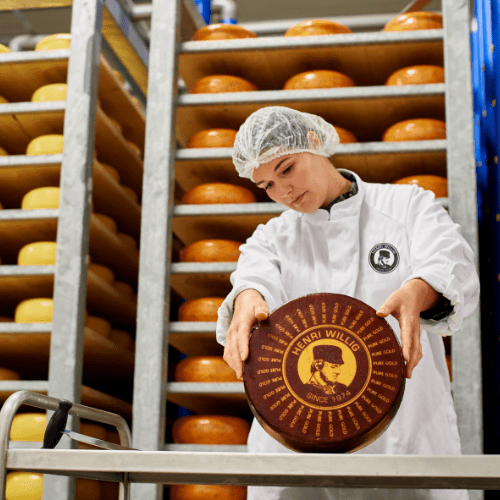Bacteria in cheese: fact or fable
Curious about the truth behind the bacteria in cheese? In this article, you will find out whether it is a fact or just a fable. Learn more about how bacteria affect the taste and texture of your favourite cheeses.

What is a bacterium?
Bacteria are tiny organisms that are all around us, including in our food. Some bacteria are useful and even essential for certain food processes, while others can be harmful and cause food spoilage or disease if present in large quantities.
What bacteria are in cheeses?
Cheese may contain different types of bacteria. Each bacterium has its own role and this has an impact on cheese production and food safety of cheese, each with its own role and impact on cheese production and food safety. For example, lactic acid bacteria are an important part in the fermentation process of cheese. They convert lactose into lactic acid, which acidifies the cheese and helps preserve it. In general, lactic acid bacteria are considered good bacteria because they improve the taste and texture of cheese and inhibit the growth of harmful bacteria.
A special case is mould cheese. After all, is mould cheese really mould? To answer you that, mould can be both desirable and undesirable. In some cheeses, such as blue-veined cheese, mould is deliberately added to create the characteristic flavour. In other cases, unintentional mould growth may actually occur as a result of unhygienic conditions. For example, coliform bacteria can occur naturally in the intestines of animals and can enter milk during the milking process. Now fortunately, most coliform bacteria are harmless, but can cause disease in humans if present in large quantities.
In most cases, the bacteria found in cheese are natural and contribute to its taste and texture!
What effects and benefits do bacteria in cheeses have?
Certain bacteria thus change the taste and texture of cheese. For instance, during fermentation, bacteria make aromatic substances that give cheese its characteristic taste and smell. In addition, bacteria play a role in changing proteins and fats in cheese, which provides the desired texture. For example, a cheese can become nice and creamy or easy to spread. Some bacteria in cheese can even be good for your gut. These specific probiotic bacteria are naturally present in certain cheeses and help improve gut flora, thus supporting the immune system.
What does Henri Willig's cheese production process look like?
Our cheeses are made in one of our two cheese dairies. Here, the milk is rigorously tested for freshness and quality, as only the best milk is used in our cheese production process. Most of our cheeses are made from pasteurised milk, which is heated together with an addition of rennet and our own special starter culture - the secret that gives cheese its Willig flavour.
All our cheeses are made to the safest possible standards. The entire process, from purchasing and logistics to after-sales service, is carefully worked out. Our production process is checked periodically according to HACCP (Hazard Analysis Critical Control Points), BRC (British Retail Consortium) and IFS (International Food Standard) standards
Frequently asked questions
There are several environmental factors that can affect the growth of bacteria in cheese. First, temperature plays a big role, as bacteria grow at specific temperatures. Humidity also plays a role; some bacteria like humid conditions, while others prefer drier ones. In addition, the acidity (pH) of the environment can affect the growth of bacteria. Some bacteria do well in acidic conditions, while others prefer a more neutral pH.
Certain bacteria can produce enzymes that help break down nutrients, making them more digestible and more easily absorbed by the body. This can lead to increased bioavailability of nutrients such as proteins and fats. In addition, some bacteria in cheese may have probiotic properties. These probiotic bacteria can be beneficial for gut health by promoting healthy gut flora and strengthening the immune system. For example, they can help with digestion, improve nutrient absorption and promote vitamin production.
There have been new developments in cheese production over the years. For example, precision fermentation uses advanced technologies to precisely watch and change the bacteria in cheese. This can help to better control the taste and texture of cheese. Special starter cultures are also created that are designed to improve certain properties of cheese, such as taste, texture and even health effects. Furthermore, automation and data analysis are increasingly being used to produce cheese more efficiently and improve its quality.



